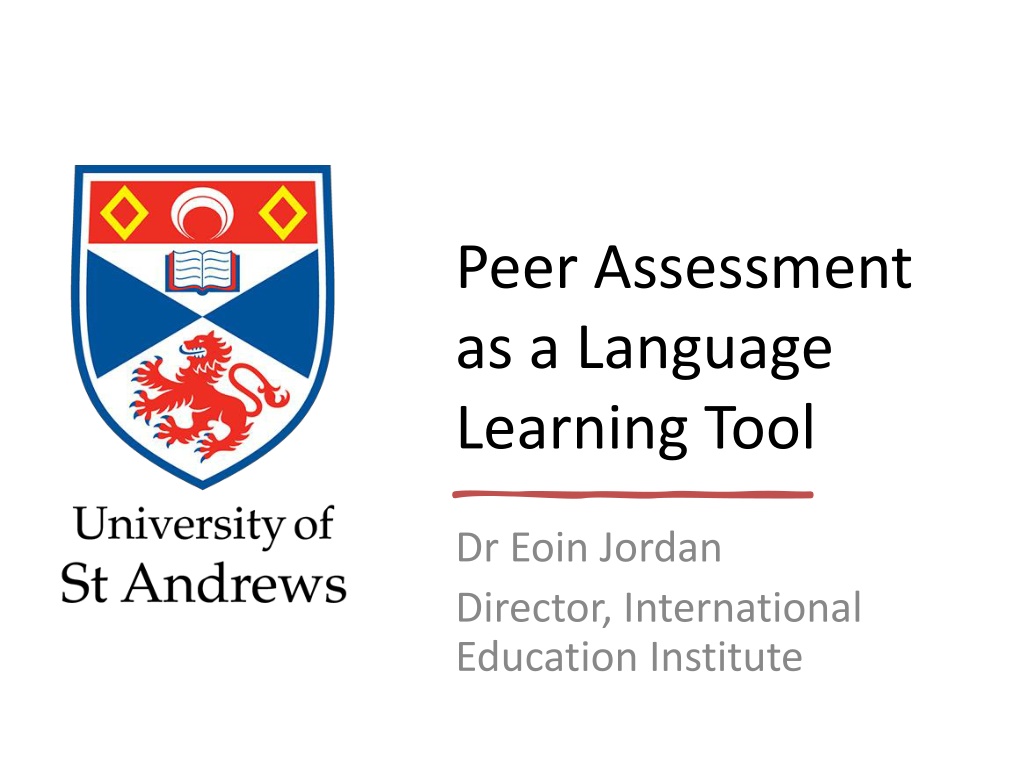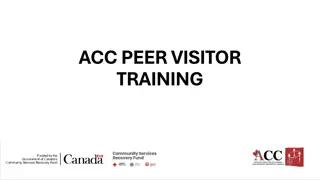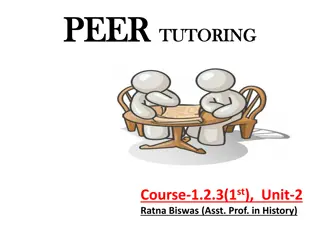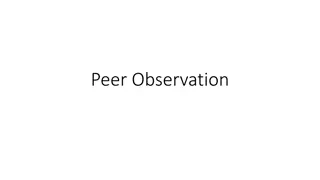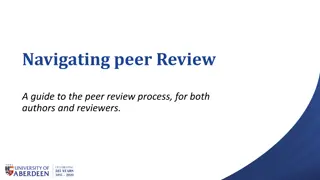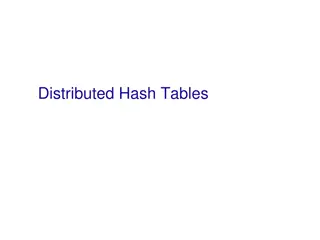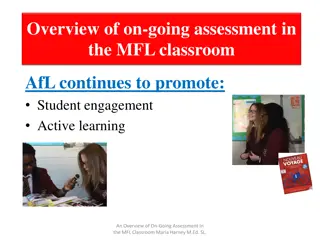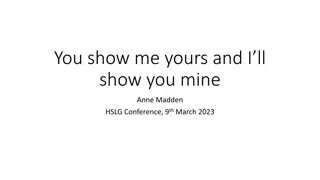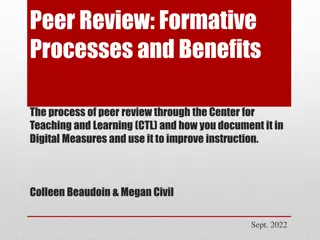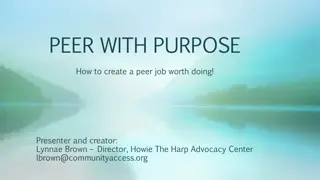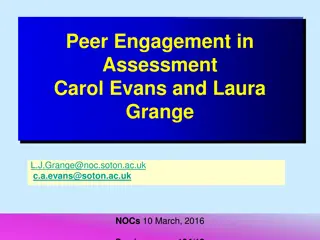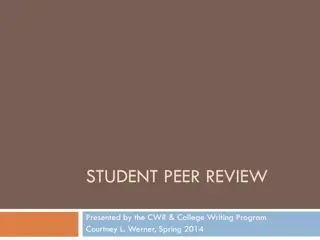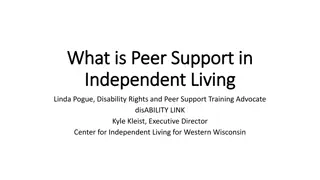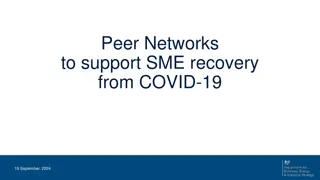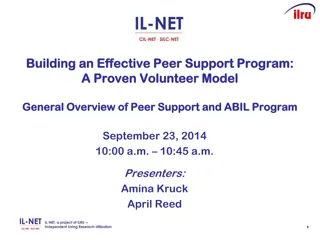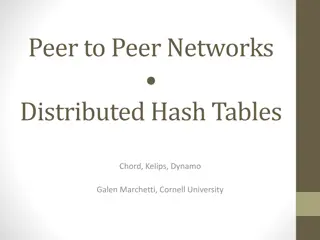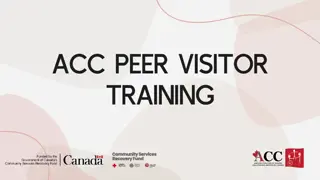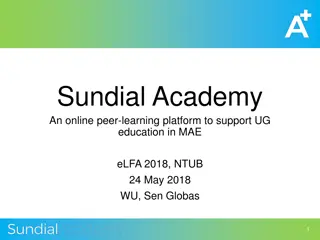Enhancing Language Learning Through Peer Assessment
Explore the benefits of peer assessment as a valuable tool for language learning, comparing it with self-assessment. Discover the components and challenges of self-assessment, along with the potential of peer assessment to improve accuracy and promote self-regulation. Gain insights into what peer assessment entails, its validity, reliability, and impact on student learning outcomes.
Download Presentation

Please find below an Image/Link to download the presentation.
The content on the website is provided AS IS for your information and personal use only. It may not be sold, licensed, or shared on other websites without obtaining consent from the author. Download presentation by click this link. If you encounter any issues during the download, it is possible that the publisher has removed the file from their server.
E N D
Presentation Transcript
Peer Assessment as a Language Learning Tool Dr Eoin Jordan Director, International Education Institute
Overview 1. Self-assessment 2. Peer assessment 3. Peer assessment for language learning 4. Available tools 5. Example of a language-focused peer assessment activity 6. Ways of using peer assessment 7. Something else
What is self-assessment? Two complementary perspectives in literature (Panadero & Alonso-Tapia, 2013): A type of formative assessment implemented by instructors A process that students implement to regulate their learning related to self-regulation (Zimmerman, 2002)
What does self-assessment involve? A model of self-assessment with 3 components (Reinholz, 2016; Sadler, 1989): Goal awareness Performance awareness Gap closure
What issues are there with self- assessment? Students assessments of their performance tend to agree only moderately with those of their teachers and mentors Students seem largely unable to assess how well or poorly they have comprehended material they have just read They also tend to be overconfident in newly learned skills (Dunning, Heath, & Suls, 2004, p. 69)
Can peer assessment help? Peer assessments of performance may be more accurate than self-assessments may promote self-assessment/regulation (Dunning et al., 2004; Reinholz, 2016)
What is peer assessment? an arrangement in which individuals consider the amount, level, value, worth, quality, or success of the products or outcomes of learning of peers of similar status (Topping, 1998, p. 250)
How valid/reliable is peer assessment? Peer assessment scores often correlate reasonably well with expert scores Two meta-analyses: r = .69 (Falchikov & Goldfinch, 2000) r = .63 (Li et al., 2016)
How valid/reliable is peer assessment? Correlation is higher when the peer assessment is paper-based rather than computer- assisted the course is graduate level rather than undergraduate or K-12 individual work instead of group work is assessed the assessors and assessees are matched at random the peer assessment is voluntary instead of compulsory the peer assessment is non-anonymous peer raters provide both scores and qualitative comments instead of only scores peer raters are involved in developing the rating criteria (Li et al., 2016, p. 245)
Does peer assessment improve learning/academic performance? In general, yes! (Double et al., 2020; Li et al., 2020; Ritonga et al., 2022; Yan et al., 2022) Effect sizes larger for online peer assessment, and with older participants (Yan et al., 2022) More improvement than no assessment or teacher assessment; not significantly different to self assessment (Double et al., 2020) Rater training and computer-mediated peer assessment associated with greater learning gains (Li et al., 2020) Also effects on language learning (Ritonga et al., 2022)
Peer assessment is not just about grading! Students can give feedback comments instead/as well Students may learn more from assessing others work than they do from being assessed (L. Li et al., 2010; Rouhi & Azizian, 2013) the assessment process may help students to become better self-assessors
A model of peer assessment - The assessment cycle (Reinholz, 2016)
How peer-assessment support self-assessment (Reinholz, 2016)
Peer assessment for language learning results indicated that using PA generated positive effects on Iranian EFL learners [reading comprehension], [reading motivation], and [vocabulary learning]. (Ritonga et al., 2022, p. 1) Information about how students peer assessed slightly vague, but the study indicated that students marked each other's vocabulary tests and comprehension question answers, with guidance from a teacher when conditions are met, learners do have the ability to assess oral performances of their own and their peers. These conditions include: the clear provision of task-related criteria, sufficient training, considerations of the learner traits and their perception, as well as the strong integration with the curriculum. (Joo, 2016, p. 80) Rubric designed to facilitate self and peer assessment of academic writing in English at a Japanese university (Deboer et al., 2023)
Does a peer have to be human.? Can AI tools such as ChatGPT take on the role of a peer in a peer assessment process? ChatGPT writing a response to a master s assignment title: https://chat.openai.com/share/56cee46c-49bb- 4070-8487-5efa2a1a75fe ChatGPT giving feedback on a sample IELTS writing response: https://chat.openai.com/share/a586297a- 38d8-470b-bdba-bcc586a32427 However, students should be wary of submitting work into AI tools!!
Available tools for self/peer assessment Pen and paper(!) Online document sharing Various online tools Moodle Workshop: https://docs.moodle.org/403/en/Workshop_activity Arop (free to use): https://www.dcs.gla.ac.uk/~hcp/aropa/index.html Also similar tools on Canvas, Blackboard and some other platforms
Example of a language-focused peer assessment activity Undergraduate Y1 Joint Delivery module Key skills for life sciences (2016) 133 students Assignment to write a CV and cover letter applying for a research project Students had to: Submit assignment Complete a marking standardisation task Self-assess their own assignment Anonymously peer-assess 4 other students assignments and leave feedback comments
Analysis Student participation Item No of students (%) Students in class 133 Submitted assignment on time 124 (93%) Completed some or all peer assessments 108 (81%) Completed all peer assessments 104 (78%)
Analysis Were student assessments and feedback accurate ? Peer marks correlated reasonably well with those that I awarded (r = .66) Peer-assessment marks were closer to my expert average marks than self-assessment marks The majority of student feedback comments were relevant, and many were also specific/detailed
Analysis I used the following rating scale to evaluate each student feedback comment: 4 = relevant and specific 3 = relevant but not specific 2 = irrelevant 1 = minimal and unspecific (e.g. uncritical/fewer than five words) 0 = no comment given X = did not complete assessment at all (adapted from Saito (2008))
Analysis Student feedback quality % of all students Relevant and specific 40.12 Relevant but not specific 32.86 Irrelevant 10.28 Minimal and unspecific No comment given/did not complete assessment 2.42 14.32
How I have used online peer assessment for assessing writing 3 patterns of usage Entirely formative Formative feedback on drafts of summative assessments Peer assessment of teacher-marked summative assignments (after final submission deadline)
Student reflections on an entirely formative task (1) What did students like? Learning through assessing other students Assessing others' work do help to improve myself Yes, it is very useful for me to emphasis the important point in my daily study by assessing other students' work. Receiving feedback from other students I can receive some suggestions from other students I like to hear others opinion
Student reflections on an entirely formative task (2) What did students dislike? Grading scheme design Maybe some specific comment is needed before each section The score sheet may be not very flexible Uncertainty about students capability to provide meaningful feedback The quality of the feedback depends on the peers and they can't guarantee the correctness I may not capable to correct some mistakes that is beyond my knowledge
Also consider checking out: Conceptual Toolkit for Language Teaching Practitioners (CTLTP): https://ctltp.wp.st-andrews.ac.uk/
References (1) Deboer, M., Leontjev, D., & Friederich, L. (2023). From language to function: developing self- and peer-assessment tools. ELT Journal, 77(1), 94 104. https://doi.org/10.1093/elt/ccac014 Double, K. S., McGrane, J. A., & Hopfenbeck, T. N. (2020). The Impact of Peer Assessment on Academic Performance: A Meta-analysis of Control Group Studies. Educational Psychology Review, 32(2), 481 509. https://doi.org/10.1007/s10648-019-09510-3 Dunning, D., Heath, C., & Suls, J. M. (2004). Flawed self-assessment: Implications for health, education, and the workplace. Psychological Science in the Public Interest, 5(3), 69 106. doi:10.1111/j.1529-1006.2004.00018.x Falchikov, N., & Goldfinch, J. (2000). Student Peer Assessment in Higher Education: A Meta-Analysis Comparing Peer and Teacher Marks. Review of Educational Research (Vol. 70). doi:10.3102/00346543070003287 Joo, S. H. (2016). Self-and Peer-Assessment of Speaking. Studies in Applied Linguistics and TESOL, 16(2). https://doi.org/https://doi.org/10.7916/salt.v16i2.1257 Li, H., Xiong, Y., Hunter, C. V., Guo, X., & Tywoniw, R. (2020). Does peer assessment promote student learning? A meta- analysis. Assessment and Evaluation in Higher Education, 45(2), 193 211. https://doi.org/10.1080/02602938.2019.1620679 Li, H., Xiong, Y., Zang, X. L., Kornhaber, M., Lyu, Y., Chung, K. S., & Suen, H. (2016). Peer assessment in the digital age: A meta-analysis comparing peer and teacher ratings. Assessment & Evaluation in Higher Education, 41(2), 245 264. Li, L., Liu, X., & Steckelberg, A. L. (2010). Assessor or assessee: How student learning improves by giving and receiving peer feedback. British Journal of Educational Technology, 41(3), 525 536. doi:10.1111/j.1467-8535.2009.00968.x Panadero, E., & Alonso-Tapia, J. (2013). Self-assessment: Theoretical and practical connotations. When it happens, how is it acquired and what to do to develop it in our students. Electronic Journal of Research in Educational Psychology, 11(2), 551 576. doi:10.14204/ejrep.30.12200
References (2) Reinholz, D. (2016). The assessment cycle: a model for learning through peer assessment. Assessment & Evaluation in Higher Education, 41(2), 301 315. doi:10.1080/02602938.2015.1008982 Ritonga, M., Tazik, K., Omar, A., & Saberi Dehkordi, E. (2022). Assessment and language improvement: the effect of peer assessment (PA) on reading comprehension, reading motivation, and vocabulary learning among EFL learners. Language Testing in Asia, 12(1). https://doi.org/10.1186/s40468-022-00188-z Rouhi, A., & Azizian, E. (2013). Peer review: Is Giving Corrective Feedback Better than Receiving it in L2 Writing? Procedia - Social and Behavioral Sciences, 93, 1349 1354. doi:10.1016/j.sbspro.2013.10.042 Sadler, D. R. (1989). Formative assessment and the design of instructional systems. Instructional Science, 18(2), 119 144. doi:10.1007/BF00117714 Saito, H. (2008). EFL classroom peer assessment: Training effects on rating and commenting. Language Testing, 25(4), 553 581. http://doi.org/10.1177/0265532208094276 Topping, K. (1998). Peer assessment between students in colleges and universities. Review of Educational Research, 68(3), 249 276. doi:10.3102/00346543068003249 Yan, Z., Lao, H., Panadero, E., Fern ndez-Castilla, B., Yang, L., & Yang, M. (2022). Effects of self-assessment and peer- assessment interventions on academic performance: A meta-analysis. Educational Research Review, 37, 100484. https://doi.org/10.1016/J.EDUREV.2022.100484 Zimmerman, B. J. (2002). Becoming a self-regulated learner: An overview. Theory Into Practice, 41(2), 64 70. doi:10.1207/s15430421tip4102
